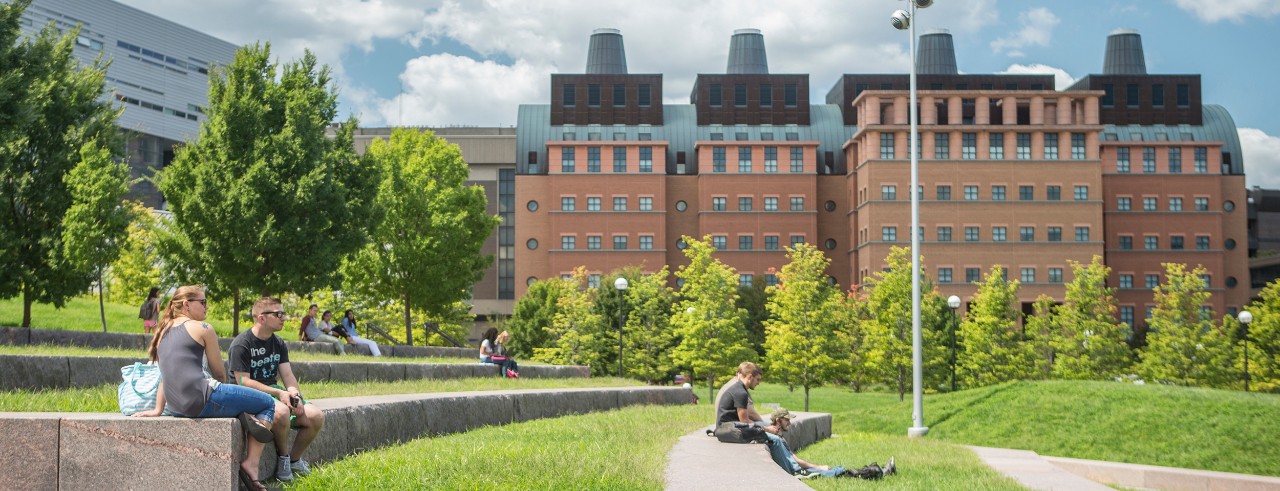
What it's like doing an out-of-state co-op
Hyojung Kim moved from Cincinnati to Idaho Falls for a semester

Hyojung Kim
Chemical engineering
University of Cincinnati chemical engineering student, College of Engineering and Applied Science (CEAS) Ambassador and member of UC's chapter of the American Institute of Chemical Engineers.
Moving to another city can be stressful to some people, but it was an exciting adventure for me. I always thought of living in different locations and working in different fields before settling down and this co-op was a great opportunity for me to try that out.
How I found my out-of-state co-op
A Society of Hispanic Professional Engineers (SHPE) meeting is what introduced me to the Idaho National Laboratory. A representative from the company was there to present to the group about what they do. After the meeting, I got their business card and expressed interest in a co-op rotation there. The following day was the UC career fair, the lab was there and I spoke with the company a second time and scheduled an interview. The day after my in-person interview, I was offered a position.
The relocation process

Hyojung Kim spent a semester in Idaho Falls on co-op working for the Idaho National Laboratory. Photo/Provided
For an out-of-state co-op, the relocation process varies by company. In my case, the Idaho National Laboratory gave me two options for travel: by flight or by car. For other co-op students who traveled by car, they were compensated for all gas they used and hotels they stayed in as long as they met the requirements for traveling a certain number of miles per day. I decided to take a flight. I communicated this with company administrators and they booked me a flight from Cincinnati to Idaho Falls based on my schedule.
After I accepted the position with the lab, they provided me with a list of housing options in Idaho Falls. The list had contact information of landlords, pricing rates, and details of the listings. The list varied from apartment units to single rooms for rent in a house. The majority of the options listed, especially the available rooms, were current or former lab employees and understood the co-op process well. Some companies will provide a housing stipend to their co-ops, but the lab did not. For housing and stipend information, be sure to check with your employer.
What I learned from co-op
When I started my co-op, I was exposed to a different world. Usually in college, you communicate mostly with classmates, upperclassmen and professors. I'd say it is like our own little world in CEAS. But in co-op, I get to see people in all different stages of life. For instance, some people just graduated college and started their career, while others have been working in the field for 20-30 years, and there are interns, like me, who are in different phases of their education.
Talking to these different people during my co-op allowed me to grow. One area that shows this growth is my research. I spent time with a chemistry doctoral student at the lab, and she showed me the research papers she has worked on. She advised me that participating in undergraduate research is a great way to rest out my interests before graduation. She also helped me find research and reach out to professors. Working at the Idaho National Laboratory also helped me find my interest in working in the energy industry and to know more about energy future.
What I did outside of work
One of the benefits of doing an out-of-state co-op is you can travel around during the weekend. Idaho has great outdoors, especially in the summer, when I did my rotation there. During the summer, I visited some national parks, some national forests, and hiked almost every other weekend. Also, compared to school semesters, you get paid full-time during co-op and that gives you less pressure on spending money trying new things. For me, I started flyfishing there and enjoyed the summer visiting different rivers.
Interested in becoming an engineering Bearcat?
Learn more about our offered programs or schedule a visit to the College of Engineering and Applied Science.
Featured image at top: UC engineering students complete a required five co-op rotations during their undergraduate programs. Mantei Center on UC's campus.
Related Stories
What it's like doing an out-of-state co-op
March 6, 2024
Hyojung Kim, University of Cincinnati chemical engineering student, spent a semester on co-op in Idaho Falls working at the Idaho National Laboratory. UC's co-op program is ranked top five in the nation. For this rotation, Kim had to relocate. This piece shares what it is like to work on co-op out of state.
UC chess team has all the right moves
March 5, 2025
UC's chess team beat 46 other college teams in the PanAmerican Collegiate Tournament to capture the divisional championship.
Get answers to all your co-op questions
At the University of Cincinnati, undergraduate engineering degrees take five years to complete, unlike the typical four-year bachelor's degree program. But that extra year is incredibly valuable for students to gain a head start on building their careers. Students receive unique, hands-on experiences during their time at the College of Engineering and Applied Science (CEAS) through the cooperative education (co-op) program. Co-op is built into the curriculum and students alternate between semesters in the classroom and semesters working full-time in industry or research.